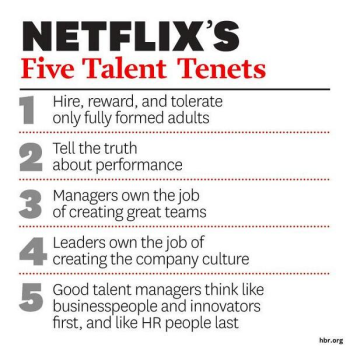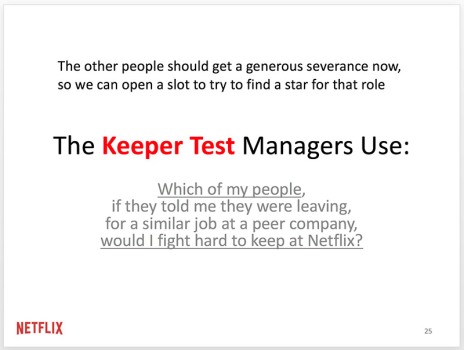No Rules Rules: Netflix and the Culture of Reinvention

GET THE #1 EMAIL FOR EXECUTIVES
Subscribe to get the weekly email newsletter loved by 1000+ executives. It's FREE!
No Rules Rules: Netflix and the Culture of Reinvention by Reed Hastings and Erin Meyer outlines the unique management and cultural practices that have contributed to Netflix's success. The book provides a deep dive into the innovative, albeit sometimes controversial, principles that Netflix employs to foster creativity and accountability among its employees. Here are some key takeaways from the book that might be especially useful for other founders and CEOs:
Freedom and Responsibility: Netflix places a strong emphasis on giving employees large amounts of freedom, paired with equally significant responsibility. This includes no fixed vacation policies and allowing employees to make large financial decisions without upper management approval. The idea is that high levels of trust encourage responsibility and spur innovation.
Context, Not Control: Instead of micromanaging, Netflix leaders focus on setting clear contexts. This means providing employees with the knowledge, company goals, and transparency they need to make decisions that align with the company's best interests. This approach can lead to better decision-making across the organization.
Highly Aligned, Loosely Coupled: Netflix encourages its teams to be highly aligned regarding the company goals but loosely coupled in how they achieve these goals. This structure allows for speed and flexibility in execution, as teams do not need to seek constant approvals from higher up.
Remove Rules: The company philosophy suggests that excessive rules curb innovation. Netflix instead opts to remove rules that do not serve a substantial purpose. This can be a radical shift for traditional companies but might foster a more adaptive and innovative organizational culture.
Nurturing Talent Density: Netflix prioritizes maintaining a high talent density—keeping a workforce of only high performers. The company pays top of market salaries and is quick to let go of even satisfactory performers if they do not meet the high standards set, a practice referred to as the "keeper test."
Candor and Feedback: Transparency and honest feedback are integral to Netflix's culture. Employees are encouraged to provide candid feedback upwards and downwards. This practice is supposed to drive personal growth and organizational improvement.
Lead with Context Not Control: Leaders are urged to inspire and educate rather than micromanage. By providing clear and thorough understanding of the situation, employees can act independently without constant direction.
On Hiring
The book focuses alot on hiring and outlines how Netflix thinks about recruitment and the hiring process. Here are some specific practices mentioned in the book:
Top-of-Market Compensation: Netflix employs a unique strategy in which it offers to pay top-of-market rates, which it defines as the highest salary an employee could make at any other company. This approach attracts high performers and discourages them from leaving for purely financial reasons.
The Keeper Test for Hiring Managers: Netflix uses a concept called the "keeper test" for its existing employees, but this also applies to the hiring process. Hiring managers should consider whether they would fight hard to keep a candidate if they were thinking of leaving. This mindset helps ensure that only truly valuable candidates are hired.
Hiring for Specific Skills Rather Than Experience Alone: Netflix focuses on hiring individuals who have the specific skills needed for a job rather than solely on their previous job titles or experience at well-known companies. This involves a detailed analysis of what actual skills and abilities are necessary for success in a position and seeking out candidates who best match these criteria.
Involving Team Members in the Hiring Decision: To ensure cultural fit and acceptance within the team, Netflix often involves team members in the hiring decisions. This can include team interviews and consensus-based decision-making processes, ensuring that new hires are welcomed and integrated smoothly.
Encouraging Employee Referrals: Recognizing that great people often know other great people, Netflix encourages employee referrals with the understanding that current high-performing employees are likely to know and recommend others who would fit well within the culture and demand of Netflix.
Testing for Candor: Since candid feedback is crucial to Netflix’s culture, during interviews, candidates may be tested on how they give and receive feedback. This helps assess whether they will thrive in an environment where such candor is commonplace.
Simulation of Real Work Challenges: Netflix sometimes uses work simulations as part of the interview process. This allows candidates to demonstrate how they approach and solve real work problems they would encounter in their role. It also gives both the candidate and the employer a clearer picture of how well the candidate might perform in their actual job.
Transparent Communication about High Performance Standards: From the outset, Netflix is clear with candidates about the high-performance culture and the expectation that only top performers thrive in their environment. This transparency helps in attracting candidates who are confident in their ability and are looking for a challenging environment.


The Keeper Test
The "Keeper Test" is a principle used by Netflix to ensure they maintain a high-performance culture among their staff. The Keeper Test is essentially a straightforward question that managers at Netflix are encouraged to ask themselves about their team members:
"If this person told me they were leaving for a similar job at another company, how hard would I try to keep them?"
How the Keeper Test Works:
Evaluating Employee Value: Managers use the Keeper Test to assess the value of an employee to the team and the company. If the answer to the test is that the manager would fight hard to keep the employee, then the employee is clearly a strong contributor. If the manager would not try hard to keep them, it may be a sign that the employee is not living up to Netflix's high standards.
Feedback and Improvement Opportunities: If a manager decides they wouldn’t work hard to keep an employee, it doesn’t necessarily mean immediate termination. Instead, it can lead to a candid conversation where the manager discusses their concerns and potential areas of improvement with the employee. This can help the employee understand where they stand and what they need to improve.
Decision Making: If the employee doesn’t show improvement after feedback and support, Netflix might consider letting them go. Netflix believes in only retaining staff who are among the best in their roles. They support those who aren’t by offering generous severance packages, allowing them to find positions where they might be a better fit.
Purpose and Impact: Maintain Talent Density: The Keeper Test helps Netflix maintain a high density of top talent. By ensuring that only the most effective, highly productive individuals stay, Netflix believes they can foster a more successful company culture.
Encourage Open Communication: This approach encourages managers to have open and honest discussions about performance regularly, preventing surprises during formal reviews. Promotes Accountability: Employees at Netflix are expected to perform consistently at high levels. The Keeper Test is a clear reminder of these expectations, promoting a culture of accountability and excellence.
While the Keeper Test can effectively maintain a high-performance culture, it also requires a high level of managerial skill and emotional intelligence to implement effectively without harming morale or company culture. Some people argue that it can create a stressful environment, as employees may feel like they are constantly being evaluated and at risk of losing their job. Thus, while powerful, this approach might not be suitable for every organisational culture or industry.
Who Should Read This Book
Founders and CEOs: Leaders looking for innovative ways to create a high-performance culture and drive growth in their companies will find valuable insights from Netflix's unconventional management practices.
HR Professionals and Managers: Those responsible for hiring, managing, and developing talent will benefit from learning about Netflix's unique approaches to recruitment, compensation, and employee development.
Entrepreneurs and Start-up Founders: People looking to build agile and adaptive teams will gain practical strategies for maintaining high talent density and fostering a culture of innovation and accountability.
Employees in Creative Industries: Workers in environments that value creativity and innovation can learn how to thrive in and contribute to high-performance cultures.
Overall, No Rules Rules offers valuable lessons for anyone interested in understanding how Netflix's distinctive culture and management practices have contributed to its success. Worth a read but served with a grain of salt as billion-dollar companies have a lot more ability to offer top-of-market salaries and have faced backlash since the book was written.

















